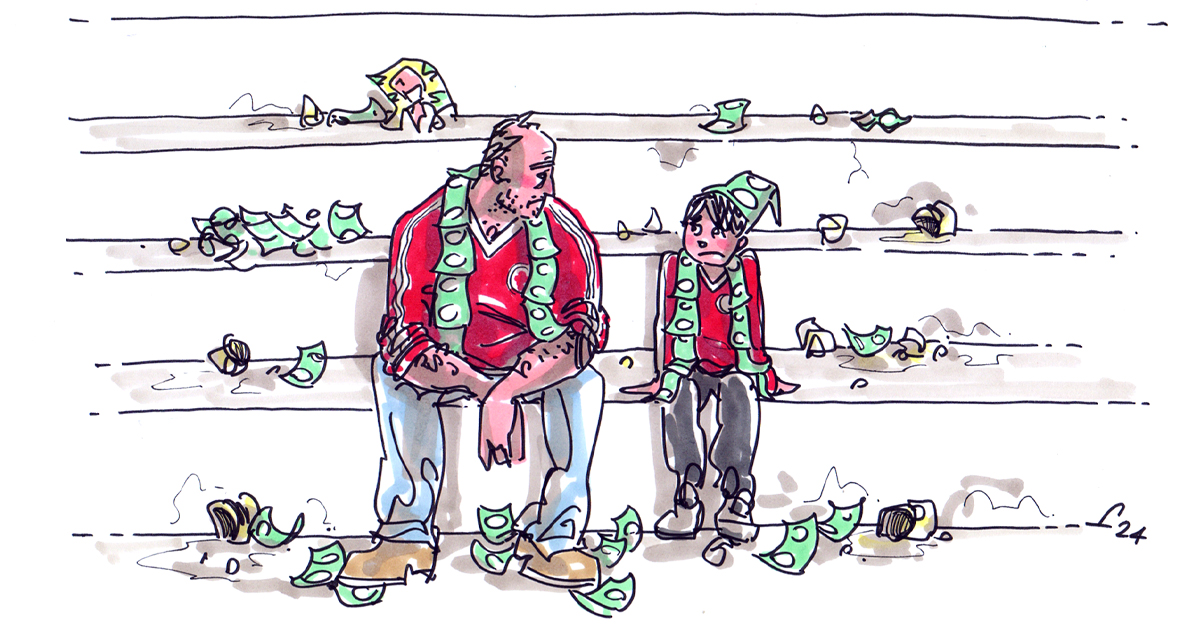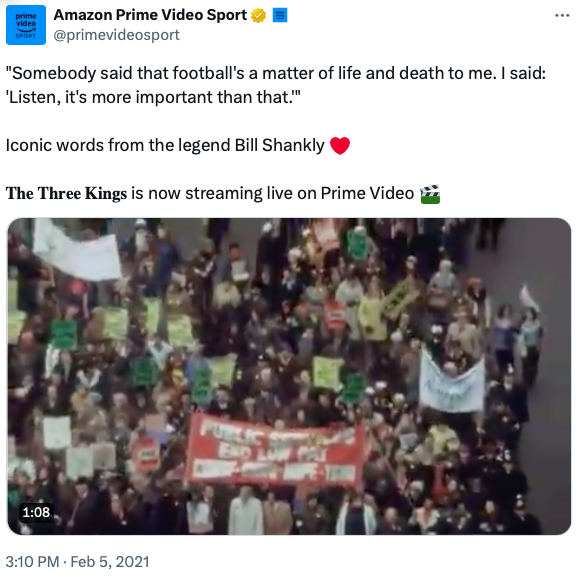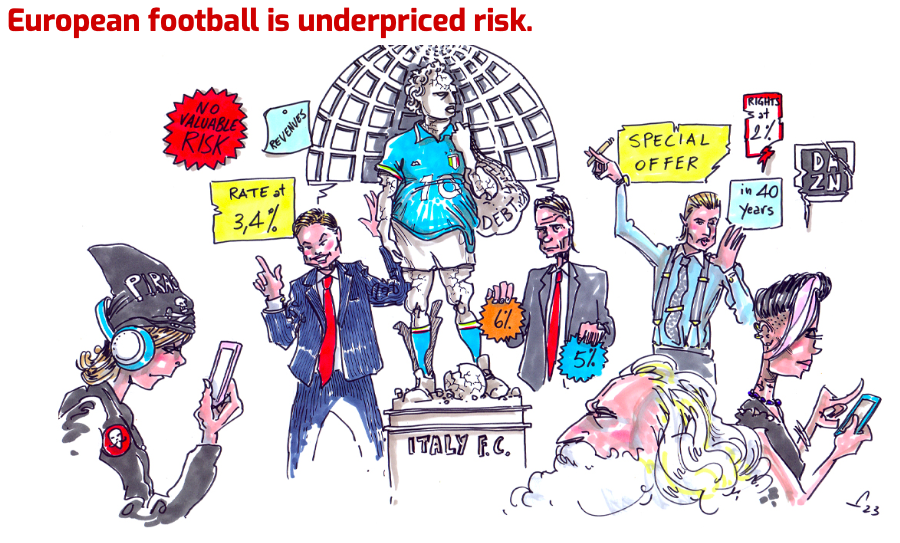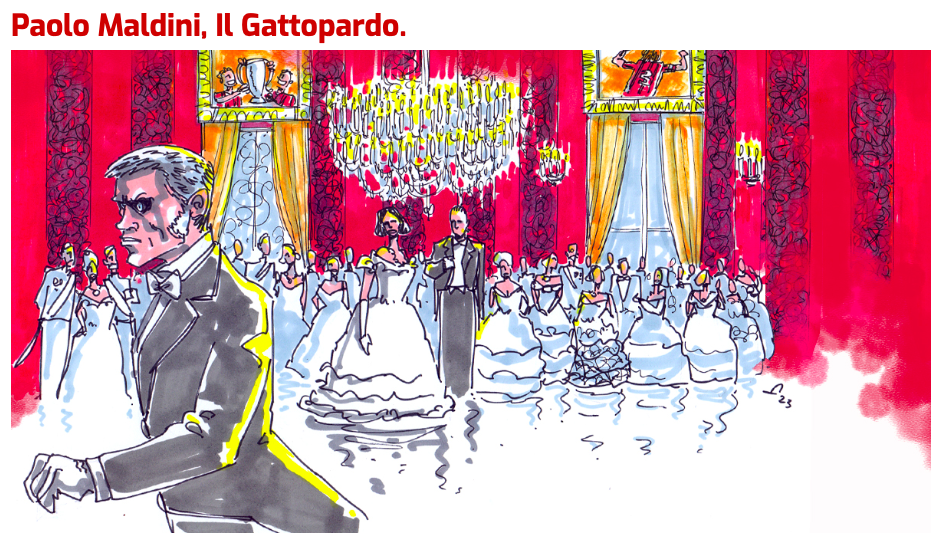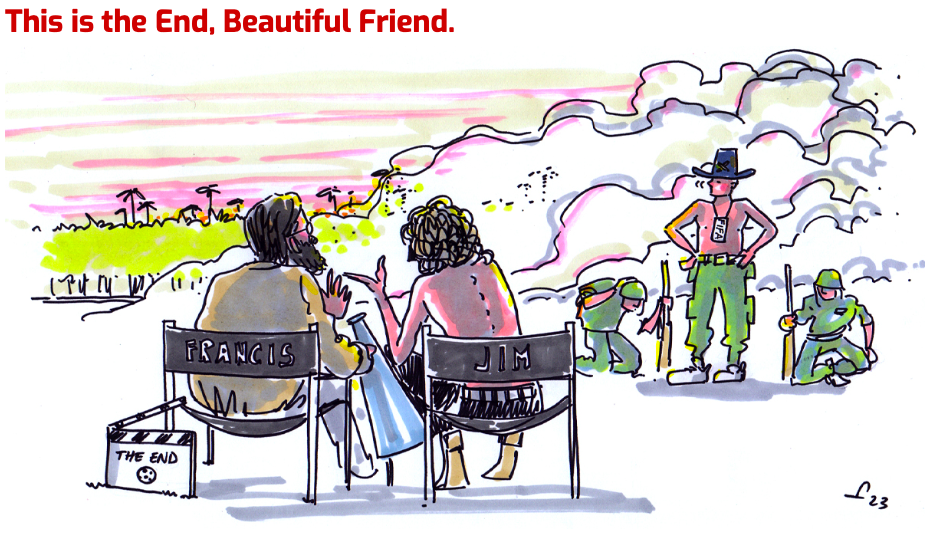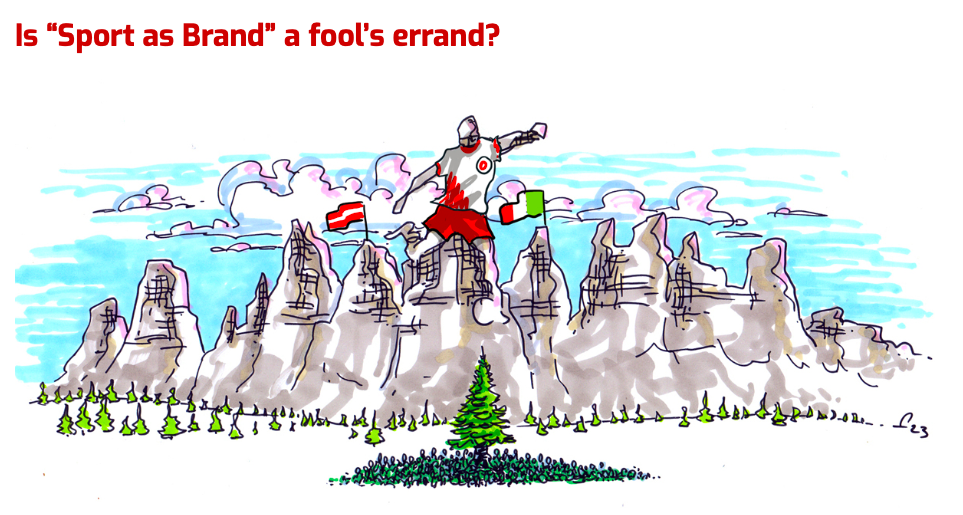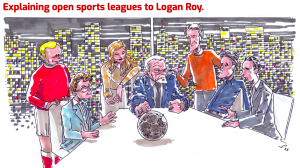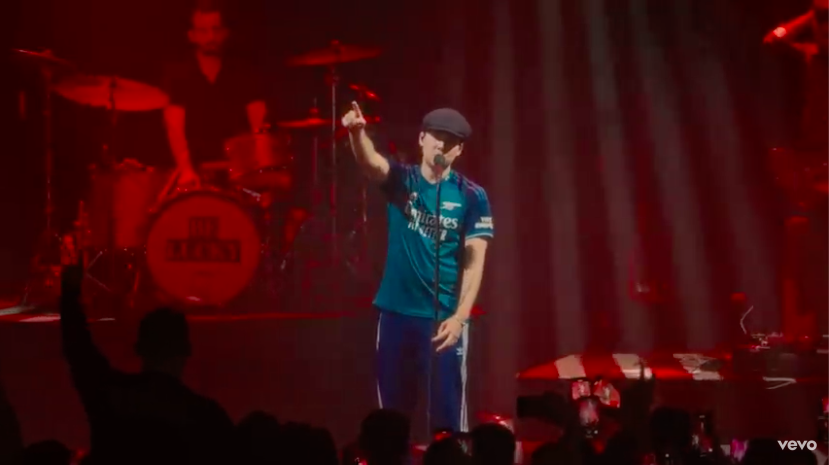I didn’t go to the FT Business of Football conference in London this week, but I did go to see the FA Cup 5th round at Chelsea. Taking the tube to Fulham Broadway with a train full of Leeds lads is certainly authentic! Seeing this storied team take the field dressed in pink is not.
It’s actually a damned disgrace, fruit of the never-ending clamour for greater revenues, squeezing the loyalty of fans.
If football is indeed a business, it treats its customer base very very badly. Doing something just because you can get away with it is never smart. Taking people for granted for too long always ends up with a shock, and regret.
Sadly, “the business of football” doesn’t really get the principle of scarcity and less-is-more. It just loves to shove evermore product and games down our throats.
Today’s Sunday Column will argue strongly that this is the wrong road.
“Sunderland Till I Die” is the king of football documentaries. It is raw and unvarnished, from the opening Shipyards soundtrack, to the intense passion in the eyes of the fans. Unlike others of this genre, from the very big clubs, it doesn’t feel like a corporate brochure of brand building and revenue generation. It more resembles a Shakespearean tragedy about a community with a football club at the centre of its soul. These people, let’s be honest, have precious little else to look forward to, and that point is so so important. Wearside isn’t New York.
Real football has very little to do with pink strips.
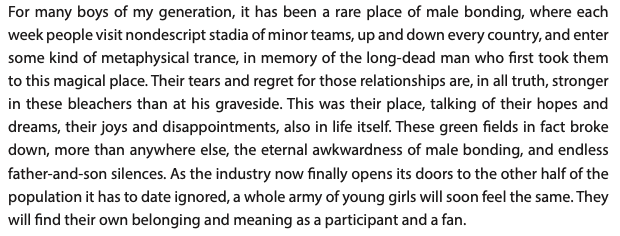
From “Sport’s Perfect Storm“
Football’s main unique selling proposition (USP) is its ability to reach across generations and connect communities. No other form of today’s content industry really does that.
The last 5 minutes of “Sunderland Till I Die” are devastating. That death in the title actually arrives with the funeral of one of the fan characters of the series, recounted with a priest’s voiceover.
This pathos is the real “business of football”.
And you realise Shankly wasn’t wrong. It is, for many people, more important than life or death. For the bulk of fans, a football club is a release, a trip, an escape.
If you have worked in the industry, you can easily lose sight of the beauty of Amazon’s “The Three Kings” about Stein, Busby, and Shankly, all working-class miners from around Lanarkshire.
But, as you get older, I can tell you that it comes back into sharp focus.
Pink kits are wrong. Leeds United, the “Damned United“, should always be in all-white unless there is a strip clash. And the 5th round of the FA Cup between them and Chelsea should always be respected as a huge game.
The “business of football” has lost its way.
Humans work on three levels: head, heart, and soul. For many, especially those doing rather OK in life, the head dominates, and controls the heart (letting it loose only on rare occasion). For others who don’t have much, to whom life hasn’t been fair or kind, the heart is what actually keeps them going every day, with intangibles like “hope”, “loyalty”, “community” and “passion”. The soul, instead, is what remains when we are dead. What our friends, family, and lovers will remember; what our God will judge.
Football is absolutely about soul.
My own head, stubborn and strong, tells me to withdraw emotional capital from today’s Celtic Football Club, not ambitious enough for my pride. And the heart just obeys, as my life is ok, with myriad other interests. I even read the FT.
But my soul…? Another matter entirely.
Celtic, for any working-class Catholic boy from Glasgow, is more than 11 players. It’s our identity, and what showed us that we could all do better in life than our parents, and compete anywhere, if we believed. When your team becomes the first British club to win the European Cup, the idea of being labelled immigrant-underdog-inferior becomes ridiculous and redundant.
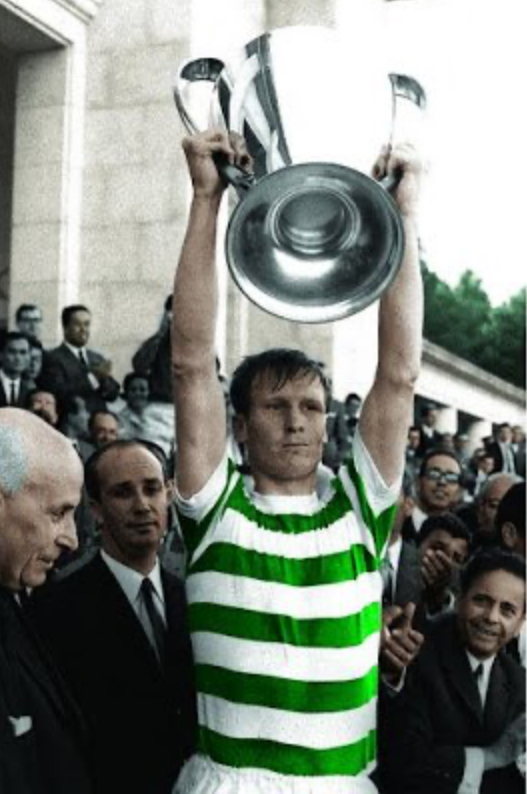
His face says much more than anything I can write here.
You called us tarriers and papes, but look what I’m holding.
This has absolutely nothing to do with the FT “business of football”, yet is why Celtic will always be a big big club, regardless where it plays, or its revenue number, or its valuation. Proper enduring value isn’t ever based on numbers, no matter how many conferences you put on to convince yourself that it is. If there is one message in the Storm, it’s that revenues and EBITDA don’t tell you anything like the full story in football.
Be careful what you wish for.
Once, at a formal event for the great and good in Scottish football, I found myself sat at a table with various senior people from the Scottish FA. There are always going to be natural tensions between an old Federation FA and a new challenger league like mine, but for them it was personal. They despised me, as a music guy outsider, as a child of Thatcher, as a smug little git “who treats us all like we’re in primary 7”. I get that. Young men of ambition, in a hurry, can be antipatico.
Your problem Roger is that you have no feeling for what football is, and what it means. It’s more than a product, more than entertainment, more than money.
Maybe, but the reality of the game they ran back then was that it had been scandalously neglected and undervalued by those butcher, baker, candlestick-maker amateurs. It was hard to watch these people in the royal boxes, smug like a Cheshire Cat, anally retentive and pedantic, telling everyone with new ideas to bugger off. They didn’t care that players were poor, relying on a career-ending testimonial to buy a pub, chattels with no freedom of contract, basically slaves.
To understand the obtuseness of football administrators in that era, one can study the days leading up to the Munich Air Crash, and the alleged intransigence of League Secretary, Alan Hardaker, in not allowing the Busby Babes more time to get back home for the Saturday game. He apparently saw no value in an English club winning in Europe, and United had to rush to get to Manchester, or forfeit the league game. We know what happened.
Football in the old days was run by jobsworths with a uniform blazer, and a fiefdom to protect.
We all wished it to change.
There was a need for a new “business of football”.
Seeing that old sport governance up close drove you into wanting to do everything the exact opposite to these people. To change, to professionalise, to capture more of football’s inherent value. And that’s what my generation did. The 90s saw new people with modern business attitudes take over, and the sportsbiz in Europe began.
Many of us got lost in the fogs of war, and overcompensated, but the best, most diplomatic ones, like Richard Scudamore, made such a difference.
Here is an intimate chat he had in Como with Grant Williams, IP content normally behind the TTMYGH paywall.
It is unmissable, as the perfect interviewer Williams, an authentic fan, questions the best of breed.
A lot of water has passed under the bridge in these 30 years, and today we can surely conclude that it hasn’t at all flown in the right direction. We, the business people, have in the main failed, and our game, always described with the adjective “beautiful”, is crying out to us.
HELP ME, I’M IN A BAD PLACE, I FEEL LIKE I’M SLIPPING AWAY.
Like the last lucid cries of a fentanyl addict, desperate in a chase for the next revenue hit.
All this has been brewing, and in many ways is the catalyst for the whole idea of this Sunday Column. Written by that capitalist child of Thatcher , a corporate financier, a natural zealot for intense disruption, someone who absolutely gets the different needs of Gen Z.
Yet a fan whose soul is now aching.
Everyone has their own limits of tolerance, and mine wasn’t in seeing the obviously unwise investment theses of private equity into football/sports leagues.
It wasn’t even seeing the old leopards, like Paolo Maldini, not being able to square their sense of what football really means, with the new Wall Street owners like Redbird.
Neither was it lamenting the horrors of court cases, points deductions, witness reliability and perjury, wanton financial doping, all tarnishing the very spirit of the game.
It wasn’t even the idea that they aren’t called football clubs any more, but brands, lifestyle choices, entertainment products.
No, it was this!
The “business of football” today promotes jesters over kings.
A clown influencer, famous only for his exaggerated drama-queen screaming, wants to create a meme by assaulting one of the best players of all time. In a charity match.
He shouldn’t even be on the same pitch as White Tuxedo Ricardo Kakà, but they say Speed brings a large new audience, to be monetised in the “business of football”.
Fuck that.
No amount of money compensates for “fake”.
These are leeches and parasites surviving and thriving on the body of the game, sucking the carcass dry. If you want to see real, authentic football pain, and anger, watch “Sunderland Till I Die”.
The jester, Speed, to football authenticity, is what John Inman or Dick Emery were to homosexuality. A clumsy insult, thinking itself funny.
And that’s the nub of it. Are we going to change the game to fit into Speed’s marketplace of content, or are we going to stay honest to our “product”?
Frankly, this has been the entire leitmotif of Are You Not Entertained? for 5 years, and is a very decent debate worthy of the most open minds, and the best intellects. But it’s no longer only a theoretical debating society exercise. Is it?
There is a body of evidence.
We have now over 30 years of hard reality to actually see where the “business of football” route has taken us.
I project myself back at that SFA table in 1998, and maybe those old administrators had more than a point. If they could have seen the future of 2024, this is what they would have thrown at me that night, with bile.
Football, and its business, has sold its soul in exchange for an ever-growing top line of money, and then paid it all out to players and their agents. For this insanity alone, football capitalism, and all of you, have failed and should be ashamed. You dress them in pink shirts and then pay away the extra dosh you made to the same average players and their agents. Chapeau.
We need to take that on the chin. It’s true. The industry of European football is perhaps unique in seeing such exponential growth of income, and still losing biblical amounts of money. The “business of football” discussion in Europe isn’t at all about revenues. It’s all to do with cost control. And when you have irrational owners paying players too much, any discussion on growing revenues becomes just irrelevant.
The “business of football” is guilty as charged.
The second order consequences of chasing the money have hurt even more than the torrents of red ink in our clubs’ annual reports. This is not even the main charge in the case for the prosecution. There are a multitude of sins.
The gap between haves and have-nots is now unmanageable.
This happens both within national leagues, but also crucially between English football and the rest. Mr Scudamore was too successful. Sport needs to have balance and uncertainty, and it doesn’t work if some of the competitors are playing with a deck so stacked to be overwhelming. There is no way on God’s green earth that Ajax should be the pauper to Bournemouth’s prince. That is objectively very wrong. Like as if Tony Hart of “VisionOn” was in the Louvre before Leonardo.
The exciting balance of parity in European football has long been lost.
It extended from Aberdeen to Athens, from St Etienne to Eindhoven, from Genoa to Glasgow. The game has now thrown away this core richness of width and diversity, and is today only really about the same handful of tediously predictable teams that have emerged through postcode lottery and financial doping. This mirrors Hollywood’s own journey to prioritise franchises like the Marvel Universal, which we see ultimately lose customer appeal in the end. In the same way, Chelsea, City, PSG, haven’t ever smelt right to fans. They may or may not be guilty of their charges. They may be discriminated against by the old clubs trying to keep them down. But to all honest fans, we know their baubles have been bought in an unnatural timeframe, by guys like Simon Pearce. We respect what Bell and Osgood did, more than Roman’s and Pep’s trophies. These legal cases could go either way with such top lawyers employed, but that’s not the point. In the courtroom of authentic fandom, the verdict on City and PSG came down a long time ago. Guilty.
Fans are losing interest.
The zenith of our game, the Champions League, has ironically morphed itself into something nothing to do with actual champions. The UEFA brand isn’t about rewarding excellence, rather in finding new ways every year to guarantee more games and revenues to the same tired mega clubs. The fans are bored. How many of us actually watched the UCL last 16 games as neutrals?
We now incentivise the ”business of football”, not glory.
To our shame, in striving for more and more revenue, the game in every country has prioritised losing (in 4th place for UCL) to winning the FA Cup. Once again, that has to be very wrong. Sunderland’s whole essence is about 1973, Bob Stokoe, Jim Montgomery, and Ian Porterfield. The Top-4-tarts instead have nothing but a healthier P&L account to brag about. Ask Spurs about what monkey is on their back. It isn’t a financial one.
We have destroyed the idea of “team-building”.
In prioritising celebrity players, with high social media following, we have forgotten the concept of “team”. We create dressing rooms of head-phoned selfish individuals, with their agents impatient to get them another move for more fees. In this way, too many of our football clubs are no longer the symbol and expression of a community, but rather the teat from which today’s mercenary player is currently choosing to suck. Not what Shankly envisaged.
Fans and athletes have lost their connection.
The distance between the traditional fan and the players has exploded to obscene levels. This is a working class game where, once, players were just a bit wealthier than the punters, and still walked the same streets. Football’s deepest roots come from those normal people at the Stadium of Light, and yet we seem to have done everything to take the game away from them. Again, exactly the opposite of what the miner Three Kings preached. What other business actively tries to distance itself and its product from its core customers? Yes, it’s an ageing audience, but it’s reductive to consider it merely as a cash-cow demographic. It is our soul, and when we lose that, we are just “content”, destined to wither away.
The “business of football” isn’t currently sustainable.
In not being run as self-sufficient, it has put itself in need of fresh investor capital, and these characters are often not people of pure sporting values. They include all sorts of bad actors. From the dodgy carpetbagger opportunists with 5’ o’ clock shadows; to private equity funds shamelessly bringing forward tomorrow’s revenues, paying themselves a full “coupon” and fees for the privilege; to American investors, often in good faith, trying to apply a totally different culture to a game 150 years old; to nation states who see the popularity as a leg-up to their culture, economy, and image.
We have let strangers into our home, and given them the deeds and keys. Who does that?
But football is still hugely popular.
That’s the camomile lotion always used against the pessimism of the Cassandra. This is wishful thinking.
Something can remain very popular, yet be fading away before our eyes. Dying.
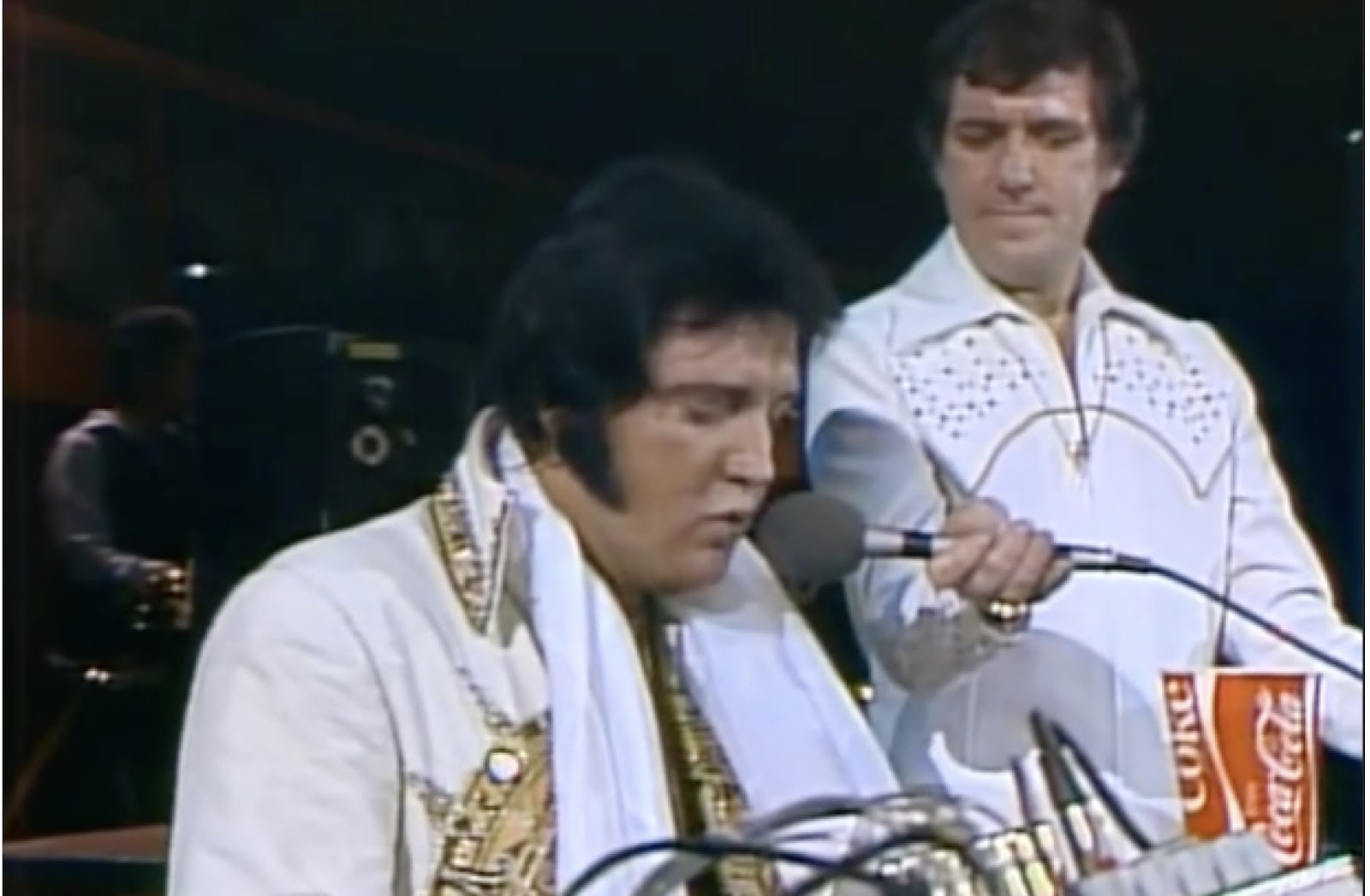
When I look at Todd Boehly’s Chelsea, I see this Elvis, needing help to sing “Unchained Melody” the night he ultimately dies.
Look around more. The product is decaying.
As only one example, Italy hasn’t qualified for the last two world cups, and no longer produces any of those immensely talented footballers of the 90s. Something is very very wrong here. Its league depends on a non-dom residency tax break to attract average foreign players to try and somehow compete with England. This version of the “business of football” by consequence is crowding out all those Italian kids.
It’s not just Italy. As the duopoly era of Messi and Ronaldo fades in the back mirror, what comes next? The game is no longer delivering a depth of generational icons. Never mind the new Best, Beckenbauer, Riva, Cruyff, Van Basten, Maradona, Romario, etc. Who is replacing Modrić, Ramos, Thiago Silva, Muller, Totti, Griezmann, Pirlo, Scholes? This goalkeeping generation is as plain vanilla anonymous as they come. Pat Jennings? Sepp Maier? Schmeichel senior? Where does an Ivan Toney sit in comparison to a Frank Worthington or Andy Gray?
Nowhere, absolutely nowhere.
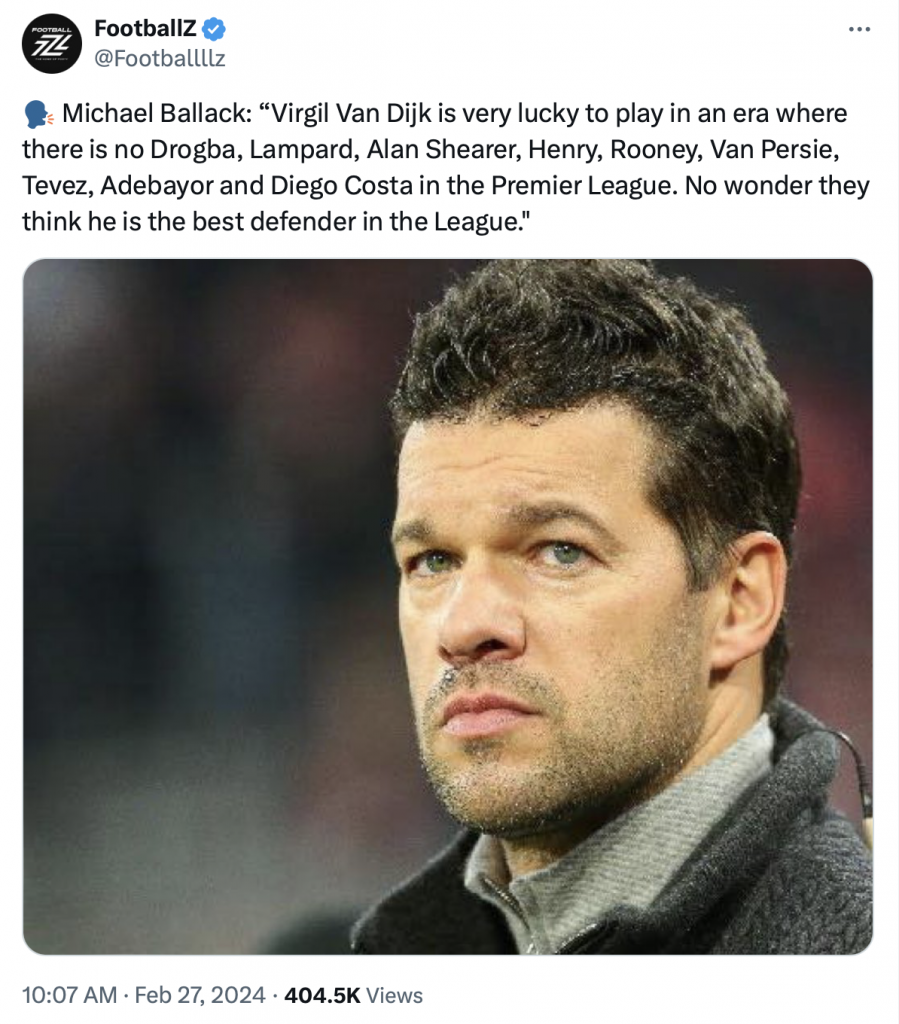
Michael Ballack is right. Regardless what the stats may say, the quality of football player has receded dramatically from 15 years ago. The product is indeed decaying.
Where is the colour and charisma?
Where are those who can really play, and not just offer athletic strength and stamina. A Stan Bowles.
The fans, especially the kids, know today’s players better as fantasy assets and triple captains, and not as examples to copy out in their garden. We need to be very careful. The game is losing its local charm and connection.
Snooker lost appeal when the Higgins/White era ended.
The “business of football” also too often focusses only on the top end, and we shouldn’t forget that a very sizeable percentage of football fans, our customer base, do NOT need to win, or be watching Messi, to enjoy their passion. They support their team, their clubs, and the community that hosts the stadium. This is true at Como as it is at Celtic.
In today’s godless society, the local football team is often the only remaining identity, and it doesn’t need to be quality and winning. It just needs to have a connection, and be authentic.
Such value cannot be artificially pumped ahead of its natural time. The Americans tried that in the 70s with Pele and the Cosmos. The Chinese tried in 5 years ago. Now Saudi.
When football is only a construct around money, its seeds will not flourish.
As he was scattering the seed, some fell along the path, and the birds came and ate it up. Some fell on rocky places, where it did not have much soil. It sprang up quickly, because the soil was shallow. But when the sun came up, the plants were scorched, and they withered because they had no root.
(Matthew 13: 1–9, 18–23)
Fans smell a financial transaction that is without soul. “Grow the game” is never going to be about paying to watch someone at the fag end of their career who patently is only there for the money.
When the sun comes up, those plants will be scorched and wither without root.
But you don’t solve problems with poetry and parable.
No matter how eruditely one makes this case for abandoning the “business of football” we still have younger generations who won’t watch 90m, 72-hole golf, or 5-day cricket. And who will still squeal in delight at the KSI and Speed version of sport. The tourist fans.
So we are at a fork in the road,.
There is a choice to be made about the direction for European football, and we can’t please everyone.
We can follow the American model of closed leagues, tight salary caps, “Dora the Explorer” entertainment gimmicks and widgets, 3D Googles. All trying to compete with other forms of entertainment head to head, changing our formats as required for the best product/market fit.
Or
We take the “Field of Dreams” route. Double down on our tradition, no matter how unrealistic that may seem, with faith in our soul. We keep promotion and relegation, and meritocracy, and try to return to the balanced game we had in the 90s, before the polarisation of wealth. But to do that, we need to remove what caused that polarisation, ie the media dollar.
This is the only truly radical roundtable debate at a conference on the “business of football”.
Has European football, its clubs and governing bodies, lost the right to manage the immense top-line media wealth it creates? Given it has pissed it away so spectacularly in the last 30 years?
This is exactly the scenario considered in the Logan Roy Column.
If evidence clearly shows that European football can’t or won’t control its costs, to make a proper sustainable business, then it shouldn’t be trusted going forward. Especially as football is not really a financial business investment.
It is a community asset of societal value.
Today, we are half-pregnant, trying to manage a compromise solution, and only delaying the inevitable outcome of the American model. No amount is growing the top-line will change that scenario.
So if they can’t be trusted, then the game needs to find a way to protect clubs from themselves, and the only way to do that is to hold the revenues back, as retained earnings for the future. There could be various mechanisms to do that.
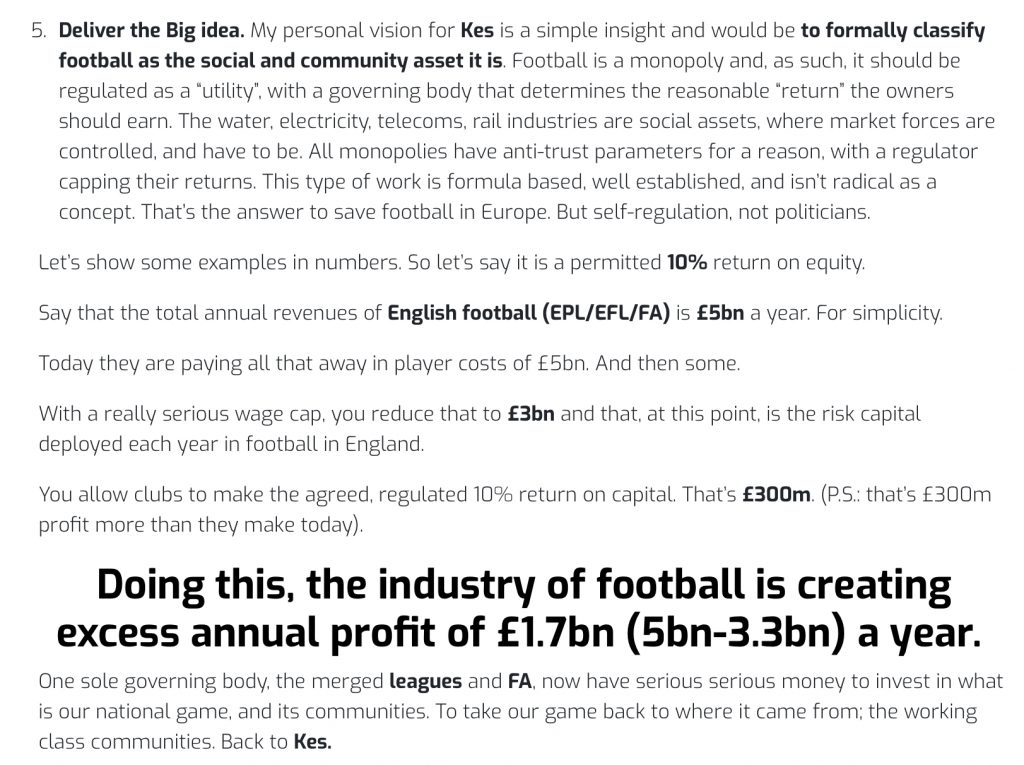
This idea is one such mechanism. There are others in the same theme.
Husband the massive media revenues that have ripped us apart, and have only worked to make Paul Pogba and his brother richer. Hold them back as an endowment fund for the future of the game, like a top university. Funds able to be invested in the fabric and pathways of a special asset of communities, fostering the game.
In this way, relegation becomes sustainable as a business, missing the Top 4 isn’t the end of the world, and priority can be given back to the FA Cup as opposed to the commercial tours to Dubai, Hong Kong and Florida.
This would need very brave leadership.
But it would be popular.
Who complains if we take back the soul of our 150-year-old game just by making players less rich, and franchise/club valuations less valuable? Is it acceptable that Mudryk earns 30% of what he does today, and Todd Boehly’s Chelsea isn’t worth anything like the $3bn he paid for it?
The answer is yes, and this column about the “business of football” ends as it should.
With these lyrics…
Cause the manor might be changing, but the people still remain.
Football is about local people, community and tribe. It is actually now a key element in trying to save the fabric of our inner cities. This is, and will become, a major political theme, not at all the “business of football”.
Listen to this crowd singing. The North London anthem has done more for the future and fan connection of Arsenal than anything else. The reality is right in front of our eyes.
These streets are our home.
The media values we create should be our rainy day piggy bank, our safety-net squirreled away, the game’s endowment fund, all managed by the poet fans of good soul.
Fans like Louis Dunford. Like Fulham’s Grant Williams. Like Bristol City’s Richard Scudamore.
That’s the real “business of football”.

To order the Limited Edition of Roger Mitchell’s book “Sport’s Perfect Storm“, click here and fill the form.
Listen to our “Are you not entertained?” sports management podcast here.
To find out what we do in change management, have a look here.
For our C-suite management services, read here.
Here you can know more about our content development work.
Discover our Corporate Learning service.
Get to know more our “Sport Summit Como” yearly sports management event here.
If you are interested in our own story, check us out here.


